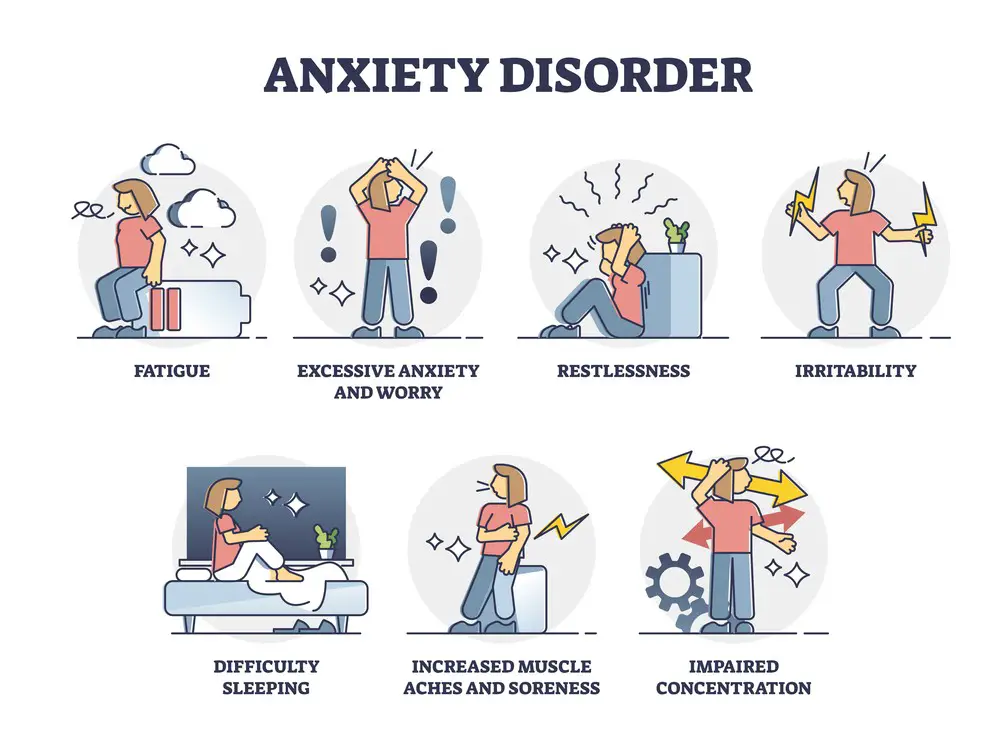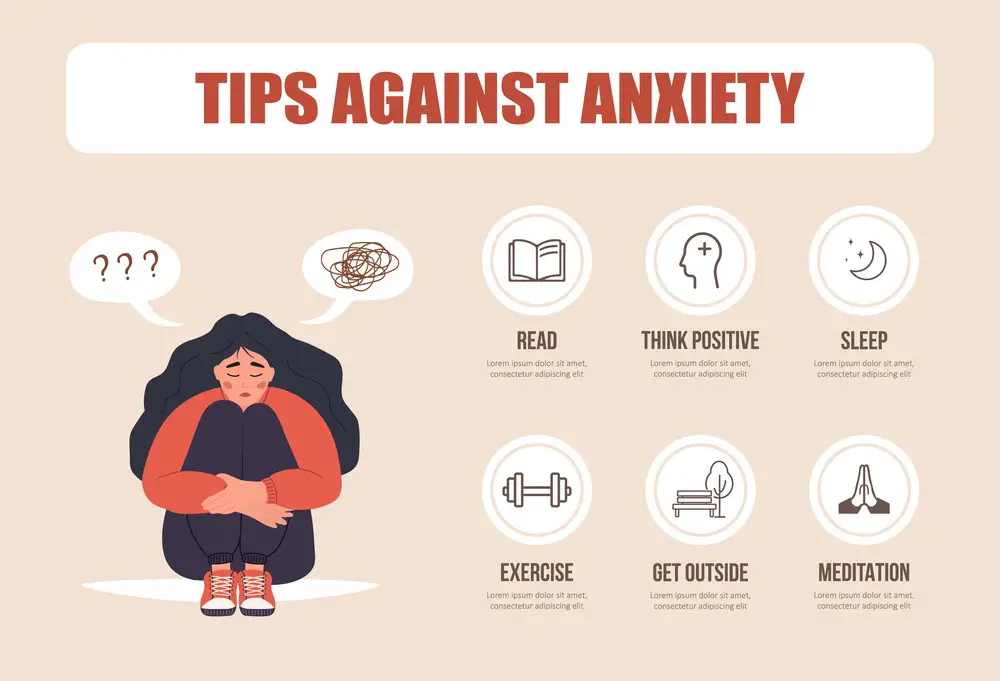As a BetterHelp affiliate, we receive compensation from BetterHelp if you purchase products or services through the links provided
Have you ever felt a sudden nervousness or an unexpected wave of panic that seems to come out of nowhere? You’re not alone if you’ve wondered whether there’s more to your anxiety than just stressful events in your life.
Many people are now looking into the possibility that their hormones could be playing hide-and-seek with their emotions.
Through this blog post, we aim to explore how hormones influence our mental state and offer guidance on regaining equilibrium. Keep reading – you might find the key to soothing those inner storms.
Hormonal Imbalance: The Hidden Culprit Behind Anxiety
 Hormones act like messengers in your body, coordinating complex growth, metabolism, and fertility processes. They also play a significant role in how you experience stress and anxiety.
Hormones act like messengers in your body, coordinating complex growth, metabolism, and fertility processes. They also play a significant role in how you experience stress and anxiety.
When your hormone levels are out of whack—whether due to menopause, thyroid issues, or other conditions—it can send your emotions on a rollercoaster ride; estrogen drops or spikes may leave you feeling jittery or nervous without any apparent reason.
This hormonal turbulence is powerful enough to trigger anxiety attacks and mood disorders in some individuals.
Your emotional well-being could be at the mercy of these chemical fluctuations. For example, low levels of testosterone have been linked to higher rates of anxiety in men, while disrupted estrogen levels are often implicated in female anxiety.
Treatments aimed at restoring hormonal balance might offer relief for those whose mental health struggles are rooted in endocrine system imbalances. It’s crucial to recognize that hormones govern the physical aspects and impact neurotransmitters tied directly to mood regulation and stress response systems.
Understanding the Link: Hormones and Anxiety
 Delving deeper into how hormones and anxiety are intertwined, it becomes clear that this relationship is quite complex. Hormonal imbalances can sow the seeds of anxiety by altering our body’s response to stress.
Delving deeper into how hormones and anxiety are intertwined, it becomes clear that this relationship is quite complex. Hormonal imbalances can sow the seeds of anxiety by altering our body’s response to stress.
For instance, elevated cortisol levels, often referred to as stress hormones, can lead to a constant state of heightened alertness, setting the stage for anxiety disorders. Other key players include estrogen and testosterone; fluctuations in these sex hormones have been linked with mood disorders and anxious feelings.
Especially in women, changing estrogen levels during different phases of their life cycle can trigger emotional well-being challenges.
Now, let’s consider the function of neurotransmitters in this hormonal interplay. They act as chemical messengers in the brain and, when influenced by hormone levels, may increase one’s propensity for anxiety.
Low estrogen levels could potentially contribute to panic attacks due to their interaction with serotonin receptors—serotonin being another crucial neurotransmitter involved in mood regulation.
Addressing chronic hormone imbalance, therefore, becomes an essential step toward mitigating persistent anxiety symptoms, particularly since long-term dysregulation can exacerbate mental health conditions.
Hormonal Fluctuations: Unraveling the Anxiety Puzzle
Hormonal fluctuations often lead to a complex web of anxiety symptoms that can baffle both doctors and patients. Shifts in estrogen and testosterone, for example, have been closely linked with changes in mental health.
When estrogen levels drastically fall, you may find yourself grappling with unexpected bouts of anxiety or panic attacks. These mood disturbances are widespread during certain life stages, such as puberty, pre-menstrual phases, post-partum periods, and menopause, when hormones are known to take dramatic turns.
Your body’s response to these hormonal shifts can be profound; chronic hormone imbalance has been identified as a potential trigger for persistent anxiety disorders. Research points out that although estrogen generally acts protectively against stress responses and depression, its fluctuating levels can paradoxically increase the risk of anxiety among women.
Balanced hormone levels contribute significantly to your emotional well-being – but when they’re off-kilter, it might feel like an invisible force is steering your mood without warning or reason.
Understanding these connections between hormone-related stress and anxiety is crucial in unraveling this part of the mental health mystery.
Taming Anxiety: Restoring Hormonal Balance
Hormones play a significant role in anxiety, and restoring hormonal balance can be vital in relieving anxious feelings. When certain hormones are out of whack, it can directly impact mood and mental state. Taking steps to get hormones back in sync may help minimize anxiety triggers.
Firstly, look at reproductive hormones like estrogen, progesterone, and testosterone.
Fluctuations in these due to menstrual cycles, menopause, or endocrine disorders can trigger anxiety in women and men.
Hormone therapy, medications, supplements, diet changes, and lifestyle adjustments may help stabilize levels. Blood tests can determine where specific imbalances exist. For women, regulating estrogen and progesterone around the menstrual cycle and menopause is particularly useful for balancing emotions.
Likewise, the stress hormones cortisol and adrenaline can become elevated with chronic stress. This perpetual fight-or-flight state generates continuous feelings of anxiety. Adaptogens, certain medications, cognitive behavioral therapy, and stress reduction techniques can help control stress hormone surges. Getting anxiety under control will, in turn, help normalize levels.
Finally, hormones that regulate sleep, appetite, metabolism, and growth, like melatonin, leptin, thyroid, and growth hormone, impact mood when deficient. Improving diet, sleep hygiene, medical treatments, light therapy, and supplement regimens tailored to the hormone in question can get levels back on track and relieve related anxiety.
Overall, a multi-pronged approach addressing individual hormone imbalances can be practical for taming anxiety. Working with doctors to determine where deficiencies or surpluses exist provides the best path to hormonal balance and anxiety relief.
Hormones at Play: How Anxiety Takes Root
 Restoring hormonal balance often eases anxiety, but it’s crucial to understand how hormones trigger this common mental health challenge. Your endocrine system is a finely tuned machine that controls hormone levels in your body, and when it gets thrown off, you might experience a surge in anxiety.
Restoring hormonal balance often eases anxiety, but it’s crucial to understand how hormones trigger this common mental health challenge. Your endocrine system is a finely tuned machine that controls hormone levels in your body, and when it gets thrown off, you might experience a surge in anxiety.
Estrogen and testosterone are two key players here; they influence brain chemistry related to mood disorders. For example, sharp drops in estrogen can lead directly to feelings of panic and fear.
Your body also produces stress hormones like cortisol during periods of high tension, which can initiate an anxiety attack. This response is supposed to protect you, yet when these hormones become chronically imbalanced, the result may be constant worry or unease.
Women might notice their vulnerability to such mood disorders intensifies due to fluctuations in sex hormones across different stages of life—hormone-related stress isn’t just about feeling nervous before a big event; it’s an ongoing battle for emotional well-being impacted by subtle changes within your biology.
The Hormonal Rollercoaster: Anxiety’s Side Effects
Feel your mood swinging and stress levels skyrocketing. This may be the work of fluctuating hormone levels sending you on an emotional rollercoaster. Hormonal imbalances often trigger anxiety, which can manifest in physical symptoms like rapid heartbeat, sweating, and breathlessness.
Women might notice these shifts during their menstrual cycle when estrogen and progesterone levels rise and fall dramatically.
Your body’s response to these hormonal fluctuations can go deeper than temporary worry or fear; it could result in ongoing anxiety disorders. Estrogen has a hand in this mix-up—it usually helps keep anxiety at bay with its calming effects but can backfire when levels drop too low or change too quickly.
These hormonal side effects take a toll on mental health, leading to difficulty concentrating, irritability, and even panic attacks that disrupt daily life. Recognizing the interplay between hormones and anxiety is crucial for finding balance again.
Hormonal Havoc: Unmasking Anxiety’s Culprit
Your mood swings and panic attacks may not just be random occurrences. They could be signs of a deeper issue: hormonal havoc-wreaking chaos on your emotional well-being. Hormonal imbalances, particularly in estrogen and testosterone levels, have a solid connection to anxiety disorders.
A sudden drop in estrogen can trigger intense feelings of worry and unease—symptoms often dismissed or misinterpreted.
Balancing these hormone levels might provide significant relief from anxiety symptoms. Treatments specifically target chronic hormone imbalance, aiming to restore your endocrine system to its natural equilibrium.
With the right approach, you can manage stress hormone production more effectively and reduce those unforeseen bouts of anxiety linked directly to hormonal fluctuations.
Finding Relief: Balancing Hormones to Combat Anxiety
If you’re struggling with anxiety, balancing your hormones might provide relief. It’s a complex process, but there are steps you can take to tackle hormone-related stress and improve your mental health.
Your body’s chemistry impacts your emotional well-being more than you might realize. Hormones can indeed stir the pot of anxiety, leading to significant mental health challenges. Recognizing hormonal imbalances is a vital step toward finding balance and relief.
It opens doors to targeted treatments that address both physical and emotional concerns. Remember, understanding the hormone-anxiety connection empowers you to seek appropriate care and regain control over your mood and life.
Conclusion
Understanding the intricate relationship between hormones and anxiety is pivotal for anyone grappling with unexplained bouts of nervousness or panic. This exploration reveals how hormonal imbalances, particularly involving estrogen, testosterone, and cortisol, can profoundly affect our mental health, triggering or exacerbating anxiety symptoms.
Recognizing these connections opens the door to targeted treatments that aim not only at alleviating the symptoms but at addressing the root cause—hormonal imbalance.
By seeking appropriate medical advice and considering lifestyle changes, restoring hormonal balance and reclaiming a sense of emotional well-being is possible.
This journey towards equilibrium underscores the importance of a holistic approach to health, where physical and mental aspects are interlinked and equally prioritized.
- 7 Ideas to Help You Relax and Unwind on a Family Vacation - April 27, 2025
- How Having Cybersecurity Protection Helps You Relax - April 25, 2025
- 8 Reasons Why Spending Time Outside Calms You Down - April 25, 2025
This site contains affiliate links to products. We will receive a commission for purchases made through these links.



